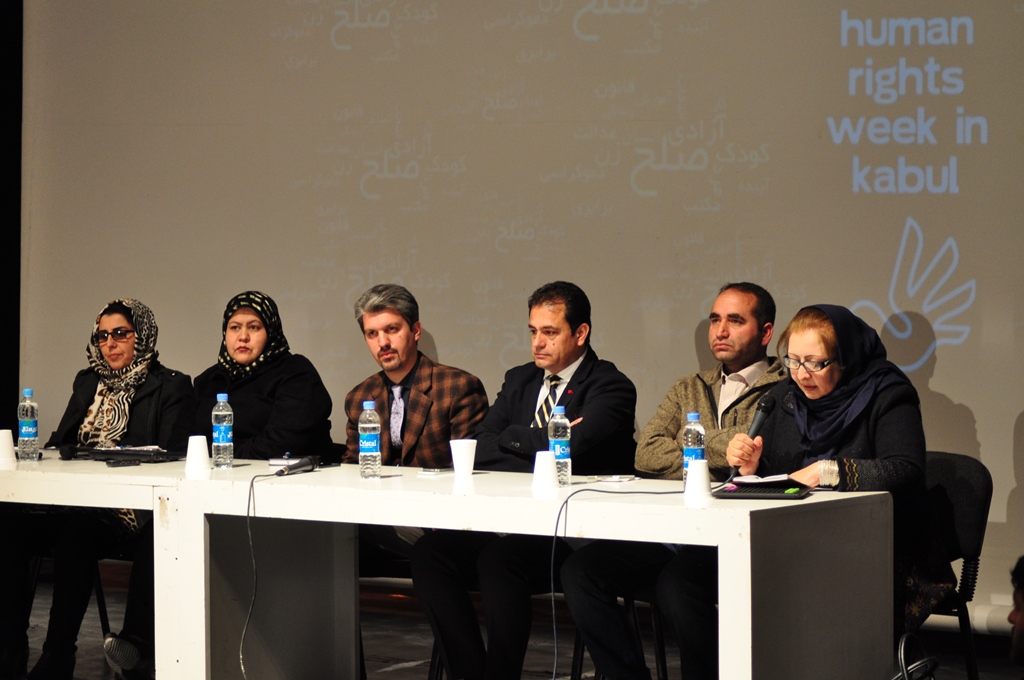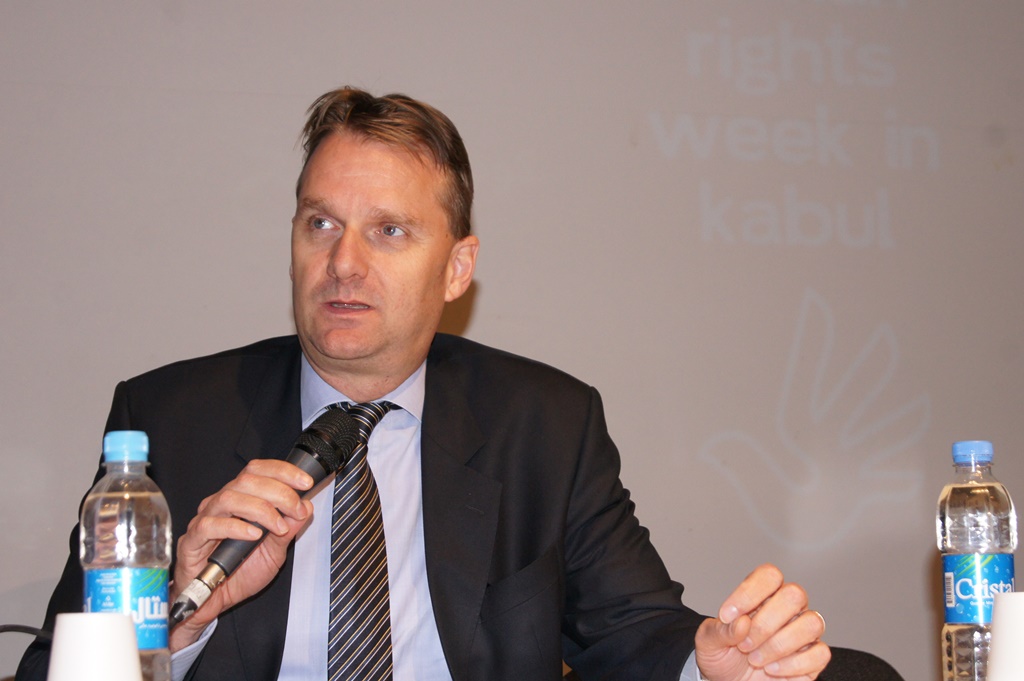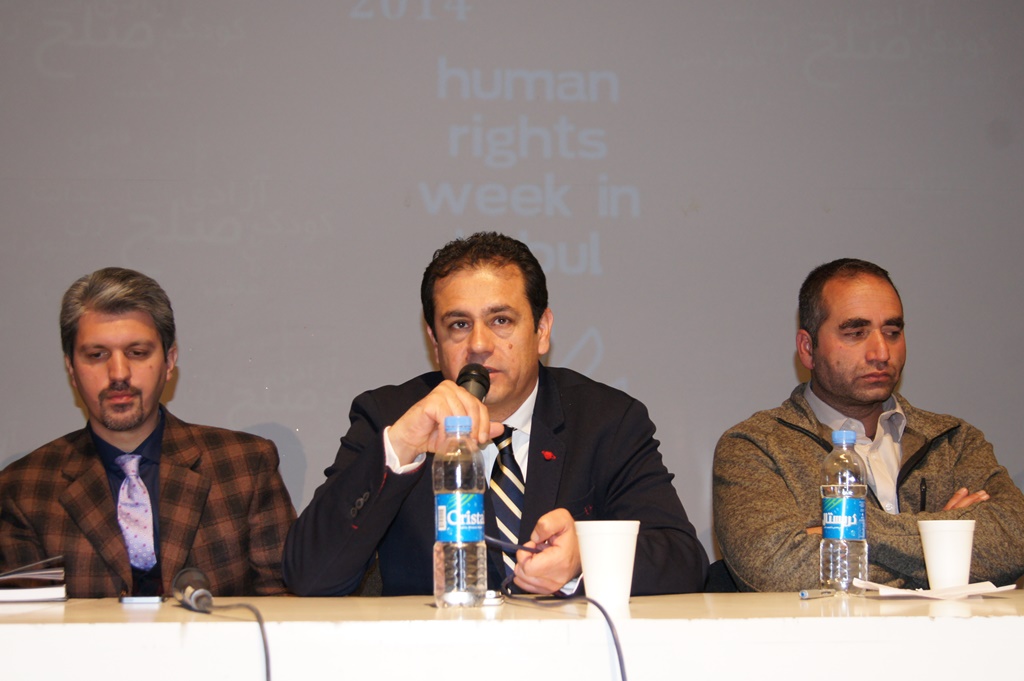Human Rights Week
Day 2: The role of media and social networks in defending human rights and democratic processes
To Mark International Anti-Corruption Day
8 December 2014
Venue: French Institute of Afghanistan
Speakers: Mr. Parwiz Kawa, Chief Editor of 8 Sobh daily; Mr Mujib Khalwatgar, Director of Nai – Supporting Open Media in Afghanistan; Mr Barri Salam, civil society activist and journalist of Good Morning Afghanistan; Ms Najiba Ayoubi, from Kilid Group Media; Ms Kazemiyeh Mohaqiq, Esteqlal University professor; Ms Roshani Yahya, freelance journalist.
Moderator: Mr Ehsan Qaneh
Monday, 8 December, was the second day of the Human Rights Week. A large number of civil society activists, visual, audio and print media journalists, intellectuals, university professors, students and citizens of Kabul attended the Goftegu public debate titled “The role of media and social networks in defending human rights and democratic processes”.
Women’s rights are human rights
Mr Henk Jan Bakker, ambassador of the Netherlands in Afghanistan, addressed a welcome note to the audience: First of all, I must thank the French Institute of Afghanistan as well as Armanshahr Foundation for providing this opportunity for me to speak to you directly. I have great interest in human rights. I have obtained my doctor’s degree in human rights and work in the field of human rights in the Netherlands Embassy. Women’s rights are human rights and human rights are women’s rights. They are the two sides of the same coin. However, I emphasise women’s rights, because they must be given priority above all.
My daughter is 16 years old. She takes great interest in human rights and wishes to continue her studies in this field. Fortunately, the best educational facilities in this area are available to her. I hope the women and young girls of Afghanistan will also have the same chance one day to fulfil their wishes. Unfortunately, it is very difficult for women in Afghanistan at present to achieve development. We hope there will come a day when women will enjoy equal rights with men. In spite of the opportunities provided in the past few years, Afghanistan is still one of the worst countries where a woman can live. We give full assurance that we will keep strongly supporting the government and the people of Afghanistan. There are many problems in Afghanistan, but we believe we can overcome them if we unite and help each other.
We need a national dialogue
Ms Najiba Ayoubi was then asked to discuss the situation and the role of the media in Afghanistan. She said: the media are of great importance for dissemination of information about civil, social and political rights. Generally speaking, the media have three major functions: dissemination of information, education and awareness-raising, and entertainment. To promote these three functions, the media should be committed to human rights values. The principal mission of the media is to address the civil and political rights of the people. Human rights will gain solid roots in any society where civil and human rights are developed.
In the past 13 years, the media have played a major role in developing the civil and political rights in Afghanistan. The work of some of the media is very promising. Unfortunately we have other media that broadcast anti-human rights messages and are involved in promoting anti-human ideas. For example, a TV broadcaster tries to ridicule women in order to make the viewers laugh. Just imagine what they wish to transmit to their audience and how harmful they are.
I think we need a national dialogue across the country involving all the people and groups. The media have an important role to play in conveying the message of such a national dialogue. They should demonstratethe extent of the people’s desire for democracy and rights. Just imagine we didn’t have the media in the past 13 years. What would happen then and where would we be now?
Reporting on violation of basic rights brought us far away from Talebanite era
Subsequently, it was Mr Khalwatgar’s turn to discuss the impact of the media on the country: The first task of the media is to provide information about human rights. What are human rights? What are their value and helpful results? Reporting on the cases in which the basic rights of individuals have been violated in different ways and providing information about those rights have moved us faraway from the Talebanite era. We find ourselves in an open and free world. We are not living in the era prior to the past 13 years. The media have changed many things.
Afghanistan, as a country that has recognised the Universal Declaration of Human Rights and has signed the International Covenant on Civil and Political Rights must do its utmost to implement those rights. The media have the task of reporting on the endeavours or failures of the government. The media have taught us why the Law for the Prohibition of Violence against Women is important and must be protected. They have taught us why the Shi’ite Personal Status Law must be amended and what it contains. The media picture all the demonstrations, assemblies and other activities of our civil society and analyse them.
Our goal is to eliminate corruption in government institutions
Pointing out the daily 8 Sobh’s disclosures about numerous financial and administrative corruption cases as well as the problem of land usurpation, Mr Parwiz Kawa said: Many people are of the opinion that corruption has expanded during the new era, cases of violence against women and self immolation have increased, disappointment has grown and so on and so forth. However, my opinion is that one of the differences between today and our society’s dark past is that we have the media today. This is an instrument that shows us what is happening in the society. It tells us which social problems have increased or decreased. Today we are more informed, because we have the media. We have 1 million Facebook users. Every single one of them is a reporter. We have more than 150 television channels. We have more than 150 radio stations. We have nearly 1000 print media. They are all excellent indications of the freedom of speech and the press.
Daily 8 Sobh, as the first print media which engaged in fundamental reporting of human rights violations and corruption, is bearing witness to the results of its work today. The people have a right to know. And we think it is our duty to inform them. In the daily 8 Sobh, we sought to compile and publish investigative reports on corruption. We began the process three years ago and our goal is to eliminate corruption in government institutions. No doubt, disclosing cases of corruption in a country like Afghanistan is not free of dangers for journalists and it can be very costly for them. Our reports may not look so important today and they may be forgotten soon. However, they can serve as valuable documents to provide a picture of the history of corruption in the country in future.
Our goal in making these disclosures is to tell the people who are somehow engaged in corruption that the people’s eyes are open and their minds are informed. The media are the eyes of the people of Afghanistan. We see what you are doing. I wish to point out two principal factors that have helped our media grow. The first is the existence of the Mass Media Law, which has protected the media in many cases. The second factor is the young generation, who does is not ideologically affiliated to anybody or any ideas. This generation is experiencing freedom and is dedicated to and optimistic about the future of the country. Young people are basically the major factor prompting the growth of the media.
Without the media, the people will be hostages of government propaganda apparatus
The next speaker, Mr Barri Salam said: A democratic system is meaningless without freedom of speech and free media. You know well that the people determine the ruler. The government in a democratic system must be accountable to the people. Therefore, the media are the best channel to convey the people’s views to the government and the latter’s response to the people. The media also inform the citizens of their rights and duties. Basically, free media, democracy, human rights or citizenship rights are not separate entities. They are heavily dependent on and help each other.
The role of the media as watchdog is of great importance. You know well that governments possess massive propaganda apparatuses, which always try to portray a sound and faultless picture of their performance. They try to justify all actions of the government. The media are the only source that can establish balance and prevent the government from self-censorship. Indeed, without the media, the people will be somehow hostages of the government propaganda apparatus.
Media have four important functions in promotion of human rights
Ms Kazemiyeh Mohaqiq emphasised that she wished to talk about what the media can accomplish: The media are creators of culture. They found that the changes in the society and constitute the structure of collective wisdom. Nowadays, a medium can be an instrument of power, i.e. it can easily penetrate the minds of people and influence their conduct. As far as human rights are concerned, the media can bring about unity in a society.
Free media have a bilateral relationship with the growth of democratic processes. They can either enhance each other or lead to one another’s decline. Free media can promote the notion of democracy, which in turn can bolster the status of free media in the society. In my opinion, the media have four very important functions in the domain of promotion of human rights: The first function is dissemination of information. The second is educational and the third monitoring. The last function is advocacy. The media can play a very important role in all four areas. Of course, I mean the free media dedicated to human rights and citizenship rights. Thus, the media can play a valuable role through collective endeavour to promote human rights notions.
Impact of social networks on democratic processes
The last speaker, Ms Roshani Yahya said: I wish to discuss the impact of social networks on democratic processes. In the past, radio, TV and the press contributed to raising the people’s awareness. However, nowadays, social networks are very effective in this sense. Their audiences are much larger than the audio and print media. At present, every user of social networks is an amateur journalist who is trying to share the news with other people by different means and even seek their opinion. The majority of the audience of social networks are young people.
These networks constitute forums of dialogue and exchange of ideas. Young people can discuss different and even sensitive issues without risking a real conflict. This is a step towards a dissent-tolerating and variegated society. You know well that social networks prompted popular revolutions in some countries, i.e. the Arab Spring in the Arab world. This is the objective significance of social networks and their role in nation-building processes within modern states.
Question and answer session:
Mr Abdulmojib, a student of the School of Law and Political Science asked Mr Khalwatgar: Do you notice the extent of foreign culture that has permeated the country through the rise and pervasion of the media?
Mr Khalwatgar replied: In my opinion, culture has a much more extensive meaning than what we know. Culture comprises all symbols and signs of human civilisation. Culture of humanism and safeguarding human values is not exclusive to a specific region or a given geography. Media are transmitters of all signs of different cultures on the earth; without exception. There is no reason to close our eyes on, say, half the world because we may feel that their conduct, behaviour and thought are different from ours.
Another participant said: My question is not directed at a specific speaker. What is your opinion on gender clichés in the media? For example, women with heavy make up in the commercials or as programme presenters.
Ms Kazemiyeh Mohaqiq answered: I agree with you that this approach exists in the media. However, according to the law and the accepted international laws, we neither can nor have the right to prevent it. By using this approach through women, the media make economic gains and this is not the case only in Afghanistan. It happens all over the world. Media ethics are still being discussed in many modern countries.
Ms Panahi, a journalist, asked Mr Barri Salam: How can you promote a new understanding of the media in a country where the people view the media as signs of promiscuity and decline of moral values?
Mr Salam replied: This has to be done through moderate and educational programmes of the media as well as by others, for example by civil society activists, cultural bodies and other such institutions. There has to be culture-building. The media must learn to respect some of the traditional values, compromise and get to know the society better. At the same time, they should enter dialogue with the people and prove to them that the media are not just economic enterprises or invaders of traditional values; but culture-rearing and culture-building institutions that work to consolidate the values and human rights.
Women’s Festival films screened:
After the conclusion of the Goftegu debate, selected films from the 2nd Women’s International Film Festival-Herat were screened for the audience.




